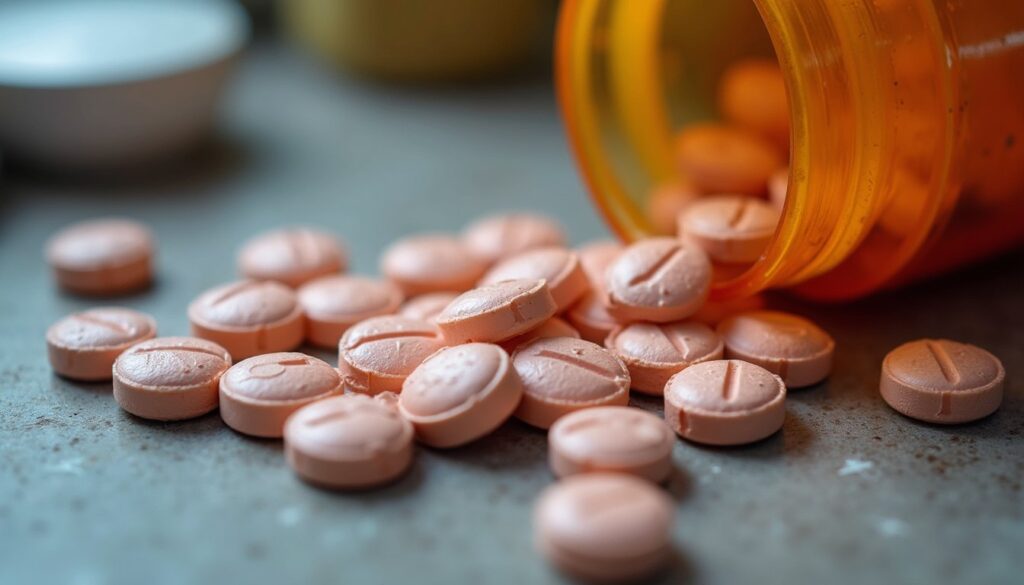You’ll find ten effective treatment options for Valium addiction, starting with medical detoxification under 24-hour supervision to safely manage withdrawal symptoms. Inpatient programs provide intensive support, while outpatient treatment offers flexibility for your daily commitments. Evidence-based therapies like Cognitive Behavioral Therapy and Motivational Interviewing address the psychological aspects of dependence, and peer support groups foster accountability. Medication-assisted treatment can ease withdrawal, while thorough aftercare planning and dual diagnosis treatment guarantee long-term success by addressing co-occurring mental health conditions alongside your recovery pathway.
Medical Detoxification Under Professional Supervision

When you decide to stop using Valium after prolonged use, medical detoxification provides the safest pathway to recovery. Healthcare professionals conduct comprehensive physical and psychological evaluations to determine addiction severity and identify co-occurring disorders. This withdrawal risk assessment examines your history of Valium use, dosage duration, and overall health status to create an individualized treatment plan.
Medical detox centers employ fluid tapering schedules that gradually reduce your dosage over several weeks, greatly decreasing complications compared to abrupt cessation. Round-the-clock supervision by doctors and nursing staff guarantees immediate intervention for seizures, delirium, or life-threatening reactions. Continuous monitoring of critical signs, mental status, and withdrawal symptoms allows professionals to adjust medications and tapering protocols, optimizing your comfort while minimizing medical risks throughout the detoxification process. Since Valium is a benzodiazepine that enhances GABA effects in the brain, medical professionals carefully manage dosage adjustments to prevent sudden chemical imbalances during withdrawal. Medical care during detoxification keeps clients as comfortable as possible while managing both physical symptoms like tremors and sweating, as well as psychological symptoms such as anxiety and agitation. Approved medications are administered to mitigate withdrawal symptoms and ensure a safer recovery process.
Inpatient Rehabilitation Programs for Intensive Support
When your Valium dependence requires more than outpatient care can provide, inpatient rehabilitation offers 24-hour medical monitoring and a controlled environment designed to keep you safe during the most vulnerable phases of recovery. You’ll receive immediate intervention for withdrawal complications, medical emergencies, or psychiatric distress, critical safeguards when benzodiazepine discontinuation carries genuine risk. This structured therapeutic setting removes access to substances while surrounding you with clinicians, peer support, and evidence-based treatments that address both your addiction and any co-occurring mental health conditions. Program durations typically range from 28 to 90 days, allowing sufficient time for stabilization and the development of essential coping strategies. Behavioral therapies, such as cognitive-behavioral therapy, help you identify and modify thought patterns and behaviors that contribute to substance use. These inpatient Valium rehab facilities provide comprehensive care specifically for individuals requiring intensive treatment for severe Valium addiction.
24-Hour Medical Monitoring
For individuals struggling with severe Valium dependence, inpatient rehabilitation programs offer 24-hour medical monitoring that can mean the difference between safe recovery and life-threatening complications. In a medically supervised environment, multidisciplinary teams respond immediately to withdrawal emergencies, including seizures and cardiovascular instability.
| Monitoring Component | Clinical Benefit |
|---|---|
| Vital signs tracking | Detects life-threatening complications early |
| Medication titration | Prevents severe withdrawal symptoms |
| Mental status assessments | Identifies co-occurring psychiatric crises |
Specialized medical protocols guide your individualized detoxification, with physicians adjusting treatment based on real-time data. This continuous oversight guarantees safe tapering while preventing the dangerous consequences of abrupt Valium cessation. You’ll receive coordinated care from admission through stabilization, creating the foundation for successful therapeutic interventions. These programs also incorporate cognitive-behavioral therapy to address underlying psychological factors contributing to addiction and help develop sustainable coping mechanisms for long-term recovery. Valium works by calming the brain and nervous system, which is why medically supervised withdrawal is essential to prevent potentially dangerous rebound effects when discontinuing the medication. Inpatient programs may also address alcohol withdrawal symptoms for individuals struggling with both Valium dependence and alcohol use disorder.
Structured Therapeutic Environment
Beyond round-the-clock medical oversight, inpatient rehabilitation programs create a structured therapeutic environment specifically designed to support intensive recovery from Valium addiction. You’ll follow a planned daily schedule that includes individual and group therapy sessions, communal meals, and recreational activities, all designed to replace substance-use patterns with healthy routines. This multidisciplinary approach integrates medically supervised detox with psychiatric care and evidence-based therapies that address both addiction’s root causes and co-occurring mental health disorders.
Living alongside others in recovery provides essential peer support and reduces isolation. You’ll participate in group therapy where shared experiences normalize the recovery process and foster accountability. The residential setting removes you from familiar triggers while centralizing all resources, medical, psychological, and social, allowing uninterrupted focus on healing. Treatment addresses physical dependence that develops with benzodiazepine use and the challenging withdrawal symptoms that can follow. Facilities like The Recovery Village offer accredited programs across the country to provide comprehensive support during your recovery journey. This all-encompassing framework builds the foundation for sustained sobriety.
Outpatient Treatment for Flexible Recovery

Outpatient treatment provides a practical pathway for individuals recovering from Valium addiction who need to balance healing with everyday responsibilities. This flexible approach allows you to live at home while attending scheduled clinic visits for therapy, medical monitoring, and medication adjustments. It’s particularly effective for mild to moderate addiction or as a step-down from inpatient care.
Your treatment team supervises safe tapering to prevent seizures and severe withdrawal symptoms while addressing co-occurring mental health concerns. Through Motivational Interviewing, group therapy, and contingency management, you’ll develop relapse prevention skills and receive peer support. Family involvement strengthens your home environment, and lifestyle modifications promote social integration.
Outpatient programs also provide counseling and education about Valium to help you understand how the medication affects your body and brain. Since women experience stronger cravings than men during benzodiazepine withdrawal, gender-specific support may be incorporated into your treatment plan. Treatment professionals recognize that Valium ranks as the third most commonly misused tranquilizer in the United States, necessitating specialized intervention approaches. Aftercare planning guarantees continued access to support groups and professional check-ins, helping you maintain long-term recovery while managing work, education, and family commitments.
Cognitive Behavioral Therapy to Restructure Harmful Patterns
While outpatient treatment provides the structural framework for recovery, Cognitive Behavioral Therapy (CBT) addresses the psychological mechanisms that perpetuate Valium dependence. You’ll learn to identify and restructure maladaptive thought patterns that drive drug-seeking behavior through evidence-based techniques.
CBT’s effectiveness in addiction recovery includes:
- Functional analysis to map your triggers, thoughts, and emotional responses
- Cognitive restructuring that challenges distorted beliefs sustaining dependence
- Skills training in stress management, emotional regulation, and problem-solving
- Mindfulness-based interventions and acceptance-based approaches for craving management
Research demonstrates CBT produces moderate effect sizes (d = 0.45) with 60% of patients maintaining abstinence at 52 weeks post-treatment. You’ll develop personalized relapse prevention strategies while addressing co-occurring conditions like anxiety and depression that commonly accompany substance dependence. Through CBT, you’ll gain tools to understand the root causes of your Valium use and build sustainable coping strategies for long-term recovery.
Motivational Interviewing to Strengthen Recovery Commitment

Complementing the cognitive restructuring achieved through CBT, Motivational Interviewing (MI) addresses a fundamental barrier in Valium addiction recovery: your ambivalence about change. This evidence-based approach resolves conflicting feelings about sobriety by fostering internal motivation rather than relying on external pressures, creating more sustainable commitment to recovery.
Through collaborative dialogue with your counselor, you’ll uncover personal reasons for change while developing self-efficacy, confidence in your ability to maintain sobriety. MI’s empathetic, non-confrontational framework builds trust and accountability, considerably improving treatment engagement rates by up to 15%. Research across 300+ peer-reviewed studies demonstrates MI’s effectiveness, particularly when combined with other therapies. This approach proves especially valuable during intake and early treatment stages, establishing the motivational foundation necessary for long-term Valium addiction recovery.
Contingency Management With Reward-Based Incentives
Contingency management (CM) uses tangible rewards, such as vouchers, prizes, or gift cards, to reinforce your abstinence from Valium and other positive recovery behaviors like attending therapy sessions. Research demonstrates CM’s effectiveness: a meta-analysis found patients achieved 4.4 weeks of successive abstinence with CM versus only 2.9 weeks without it, with particularly strong benefits if you’ve experienced previous treatment failures or have co-occurring mental health conditions. By providing immediate, objective reinforcement when you submit negative drug tests or complete treatment milestones, CM strengthens your motivation and engagement throughout recovery.
How Incentives Motivate Sobriety
How can structured rewards help overcome the powerful grip of Valium dependence? Contingency management employs operant conditioning principles to reinforce your abstinence through immediate, tangible incentives. These reward structures create predictable positive reinforcement that competes with the drug’s effects.
Key motivational mechanisms include:
- Immediate feedback on negative drug screens strengthens your commitment to sobriety through consistent reinforcement
- Escalating rewards for consecutive achievements amplify your motivation to maintain sustained sobriety over time
- Tangible incentives like vouchers or prize draws make recovery milestones concrete and meaningful
- Shifting motivation from external rewards to internal drive as repeated successes build your confidence
You’ll find that transparent incentive structures foster trust in treatment while replacing Valium’s reinforcing effects with healthier behavioral patterns.
Evidence Supporting Contingency Management
Over three decades of rigorous scientific investigation demonstrate that contingency management consistently outperforms standard interventions for substance use disorders, including benzodiazepine dependence. Systematic reviews and meta-analyses confirm that you’ll experience higher abstinence rates and better treatment retention with CM compared to traditional approaches. The U.S. Department of Health and Human Services endorses CM as evidence-based practice, particularly effective if you’ve attempted treatment multiple times previously.
Research demonstrates comparative cost effectiveness, especially for challenging populations where few alternatives exist. You’ll benefit from improved medication adherence and clinic attendance alongside reduced substance use. However, longitudinal abstinence durability after incentive removal requires further investigation. While most evidence derives from controlled studies, federal grants and healthcare payers increasingly support CM implementation in real-world clinical settings, reflecting confidence in its therapeutic value.
Narcotics Anonymous and Peer Support Groups
While professional medical treatment forms the foundation of Valium addiction recovery, peer support groups like Narcotics Anonymous (NA) provide essential community-based reinforcement that addresses the profound isolation many individuals experience during dependence.
NA operates through structured meetings where you can share experiences in confidential, non-judgmental environments. The program’s effectiveness stems from several evidence-based mechanisms:
- Sponsor guidance from experienced members who mentor you through early recovery challenges and provide accountability
- Social reintegration through community-building that restores healthy connections disrupted by addiction
- 12-step philosophy emphasizing total abstinence and systematic progress through recovery stages
- Peer accountability that reinforces treatment goals and reduces relapse risk
Research demonstrates that regular NA participation correlates with improved long-term outcomes, though groups function best as adjuncts to professional treatment rather than replacements.
Medication-Assisted Treatment for Withdrawal Management
Because Valium withdrawal presents serious medical risks including seizures and severe psychological distress, medication-assisted treatment (MAT) forms the clinical cornerstone of safe discontinuation. Your physician will implement a gradual tapering protocol, typically reducing doses by 10–25% weekly under close supervision. Adjunct medications, including SSRs for anxiety, anticonvulsants for seizure prevention, and baclofen for cravings, address specific withdrawal symptoms while minimizing complications.
Medical monitoring enables prompt intervention for cardiovascular instability or acute psychological deterioration. If receiving take home dosing precautions, you’ll follow strict protocols to prevent misuse. Medication storage security becomes essential to safeguard controlled substances from diversion or accidental exposure. Your treatment team evaluates polydrug use patterns and psychiatric comorbidities to optimize safety. Integrating MAT with psychosocial support considerably improves outcomes and facilitates progression to sustained recovery programs.
Comprehensive Aftercare Planning for Long-Term Success
After completing initial Valium detoxification and stabilization, your recovery depends on structured aftercare that addresses the psychological, behavioral, and social dimensions of benzodiazepine dependence. Thorough planning integrates ongoing therapy and monitoring to sustain progress, relapse prevention strategies customized to your specific triggers, and sustainable support networks that reinforce your commitment to sobriety. This coordinated approach guarantees you’ll move from intensive treatment to independent living while maintaining access to the resources necessary for long-term recovery.
Ongoing Therapy and Monitoring
Your ongoing therapy and monitoring typically includes:
- Evidence-based therapeutic interventions such as cognitive-behavioral therapy (CBT), motivational interviewing, and contingency management that address psychological triggers and co-occurring disorders
- Regular clinical assessments through scheduled appointments, urine drug screening, and mental health evaluations to detect early warning signs and adjust treatment protocols
- Support group participation in programs like Narcotics Anonymous, providing peer accountability and shared problem-solving strategies
- Medical monitoring for residual withdrawal symptoms and necessary pharmacological adjustments
This structured approach greatly improves abstinence rates, with some populations achieving up to 80% sustained recovery following prescription-based dependence.
Relapse Prevention Strategy Development
Most individuals recovering from Valium addiction will experience cravings or face triggering situations, making a thorough relapse prevention strategy essential for sustained recovery. Your personalized plan should emphasize trigger identification through systematic journaling and cognitive-behavioral techniques, helping you recognize internal triggers like stress and anxiety alongside external cues tied to past use. Effective trigger management combines avoidance planning with active coping skills, grounding exercises, assertive communication, and mindfulness practices that strengthen emotional regulation. Environmental restructuring supports lasting change by removing paraphernalia and modifying routines. Regular check-ins with healthcare providers guarantee accountability, while honest disclosure about warning signs enables early intervention.
| Strategy Component | Action Steps | Expected Outcome |
|---|---|---|
| Trigger Identification | Journaling, CBT mapping | Increased self-awareness |
| Lifestyle Modification | Exercise, sleep hygiene | Reduced relapse risk |
| Accountability Systems | Scheduled check-ins | Sustained motivation |
Building Sustainable Support Networks
When you complete formal treatment for Valium addiction, the passage back to daily life represents one of your most vulnerable periods, making extensive aftercare planning not just beneficial but essential for long-term success. Sustainable support networks reduce relapse risk through structured accountability and continuous therapeutic engagement.
Your comprehensive aftercare framework should include:
- Sober living environments or transitional housing programs that bridge intensive treatment and independent living through peer accountability and structured routines
- Regular outpatient counseling addressing co-occurring disorders, unresolved trauma, and ongoing stressors with mental health professionals
- Active participation in peer support groups such as Narcotics Anonymous, providing mentorship, belonging, and honest reflection spaces
- Family involvement through education and counseling that rebuilds trust, improves communication, and addresses codependency patterns
Evidence consistently demonstrates that extended aftercare significantly lowers relapse rates.
Dual Diagnosis Treatment for Co-Occurring Mental Health Disorders
Integrated dual diagnosis treatment addresses both Valium addiction and co-occurring mental health disorders within a single, all-encompassing care plan, an approach that’s proven markedly more effective than treating either condition in isolation. Integrated treatment programs achieve a 68% remission rate at one year, alongside an 88% reduction in intoxication rates from baseline. You’ll receive evidence-based therapies like CBT and trauma-focused interventions customized to your specific psychiatric conditions, most commonly anxiety, depression, and trauma-related disorders. Dual diagnosis care extensively reduces hospitalizations and emergency visits compared to single-focus models. Research demonstrates that patients with co-occurring psychological, familial, or legal issues don’t experience higher relapse rates when both conditions are addressed simultaneously through medically supervised detox, ongoing symptom assessment, and extensive aftercare planning.
Frequently Asked Questions
How Long Does Valium Stay in Your System After Stopping?
Valium stays in your system for 1–6 weeks after stopping, depending on usage duration and individual factors. Its long half-life duration of 20–50 hours means the drug and active metabolites clear slowly through urine, blood, saliva, and hair tests. You’ll find withdrawal symptoms may begin while Valium’s still detectable in your body. Your maturity, liver function, and dosage history profoundly affect elimination time, so you’ll need medical supervision when discontinuing to prevent dangerous complications like seizures.
Can I Recover From Valium Addiction Without Professional Treatment?
While you might consider home detox options, recovering from Valium addiction without professional treatment is extremely risky and often unsuccessful. Self-detox markedly increases your risk of life-threatening seizures, severe psychological symptoms, and relapse. You need a medically supervised tapering medication plan to safely reduce dosage and minimize dangerous withdrawal complications. Professional treatment addresses underlying addiction causes and co-occurring disorders that you can’t manage alone, substantially improving your long-term recovery outcomes and safety.
What Is the Success Rate of Valium Addiction Treatment Programs?
The success rate of inpatient treatment programs ranges from 25% to 80% depending on your addiction severity and treatment adherence. You’ll find the efficacy of cognitive behavioral therapy greatly improves outcomes when combined with medically supervised detox. If you’re dealing with severe dependence, expect lower initial rates, but extensive programs addressing your psychological and medical needs show the highest success. Your commitment to aftercare and avoiding polysubstance use directly impacts long-term recovery.
Does Insurance Cover Valium Addiction Treatment and Rehab Costs?
Yes, most insurance plans cover Valium addiction treatment under the ACA and Mental Health Parity Act, including detox program coverage and outpatient therapy options. However, your specific benefits vary by plan, and you’ll likely face deductibles, co-pays, or coinsurance. Pre-authorization is often required, and coverage may depend on demonstrating medical necessity. If you’re uninsured or underinsured, financial assistance, Medicaid, sliding-scale fees, and state-funded programs can make treatment accessible and affordable for your recovery expedition.
Will I Ever Be Able to Use Valium Again After Recovery?
Medical consensus strongly advises against using Valium after recovery due to high relapse risks (40-60% within the initial year). Even prescription use can trigger psychological and physiological dependence. There aren’t safe moderation guidelines for recovered individuals, complete abstinence remains the standard recommendation. If you’re currently using Valium, work with your doctor on a supervised tapering plan. Alternative treatments for anxiety exist that won’t jeopardize your recovery. Your long-term health depends on avoiding re-exposure.











